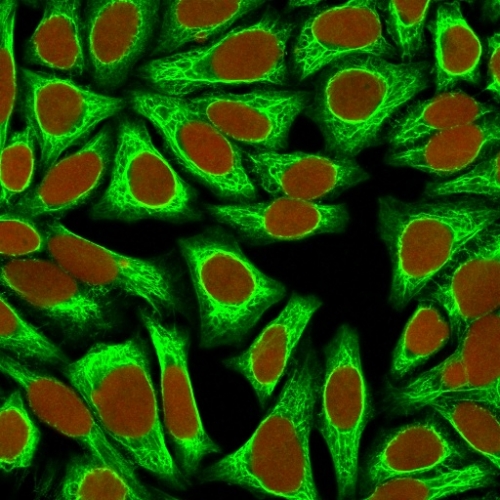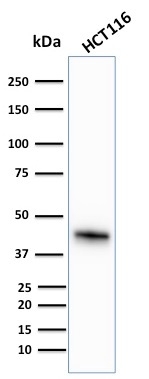Learn about our comprehensive antibody validation methods to ensure monospecificity. Antibody Validation>>

Formalin-fixed, paraffin-embedded human Prostate Carcinoma stained with Cytokeratin 18 Mouse Monoclonal Antibody (KRT18/836).

Confocal Immunofluorescence image of HeLa cells using Cytokeratin 18 Mouse Monoclonal Antibody (KRT18/836) Green (CF488) and Reddot is used to label the nuclei.

SDS-PAGE Analysis of Purified Cytokeratin 18 Mouse Monoclonal Antibody (KRT18/836). Confirmation of Integrity and Purity of Antibody.

Western Blot Analysis of human HCT116 cell lysate using Cytokeratin 18 Mouse Monoclonal Antibody (KRT18/836)

Analysis of Protein Array containing >19,000 full-length human proteins using Cytokeratin 18 Mouse Monoclonal Antibody (KRT18/836) Z- and S- Score: The Z-score represents the strength of a signal that a monoclonal antibody (MAb) (in combination with a fluorescently-tagged anti-IgG secondary antibody) produces when binding to a particular protein on the HuProtTM array. Z-scores are described in units of standard deviations (SD's) above the mean value of all signals generated on that array. If targets on HuProtTM are arranged in descending order of the Z-score, the S-score is the difference (also in units of SD's) between the Z-score. S-score therefore represents the relative target specificity of a MAb to its intended target. A MAb is considered to specific to its intended target, if the MAb has an S-score of at least 2.5. For example, if a MAb binds to protein X with a Z-score of 43 and to protein Y with a Z-score of 14, then the S-score for the binding of that MAb to protein X is equal to 29.
This MAb reacts with a wide variety of simple epithelia. It does not react with stratified squamous epithelia. It reacts with epithelial tumors of the gastrointestinal tract, lung, breast, pancreas, ovary, and thyroid. Cytokeratin 18, which belongs to the type A (acidic) subfamily of low molecular weight keratins, exists in combination with cytokeratin 8. It is reported that tissues from gastrointestinal tract are positive for both cytokeratin 8 and 18 but do not contain cytokeratin 14. Tissues from gastrointestinal tract, respiratory tract and urogenital tract, as well as endocrine and exocrine tissues and mesothelial cells are positive for cytokeratin 18.
There are no reviews yet.